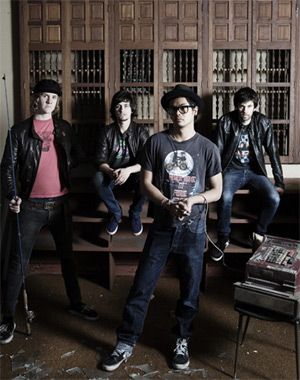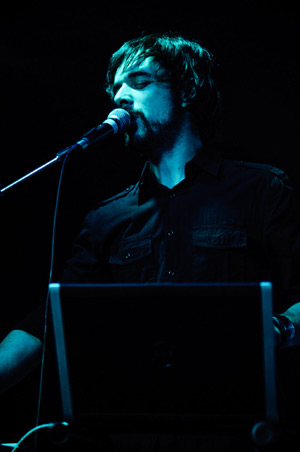“What Makes A Great Live Performance?” for Creative Deconstruction
[A guest post for Refe Tuma over at Creative Deconstruction. Original post here.]
This is a guest post by Andrew McMillen, a music writer based in Brisbane, Australia. Andrew is coordinating blog content for an Australian music event, One Movement For Music, which debuts in October 2009. The blog at OneMovementWord.com contains interviews with artists and speakers appearing at the event, Australian music news, as well as guest posts exchanged with the likes of Creative Deconstruction’s Refe Tuma.
 For both music fan and critic, the most exciting live music experience is the great unknown. Bearing witness to an act you’d not previously heard, but becoming completely immersed in their art. Becoming an instant convert to their cause. Becoming willing to hit the merch desk immediately after they’re done playing in order to buy something – anything! – that the band have created; to have, to hold, and to listen. Those are the kinds of performances that music critics such as myself love to write about; they’re also the kinds of performances that A&R folk spend their careers trying to witness, in order to sign and release the act’s music on behalf of their label.
For both music fan and critic, the most exciting live music experience is the great unknown. Bearing witness to an act you’d not previously heard, but becoming completely immersed in their art. Becoming an instant convert to their cause. Becoming willing to hit the merch desk immediately after they’re done playing in order to buy something – anything! – that the band have created; to have, to hold, and to listen. Those are the kinds of performances that music critics such as myself love to write about; they’re also the kinds of performances that A&R folk spend their careers trying to witness, in order to sign and release the act’s music on behalf of their label.
I’ve been a live music critic since June 2007. Two ‘great unknown’ performances stick in my mind. The first was in September 2008. I was reviewing an industry showcase event for the Brisbane-based Big Sound music conference. Four bands each had thirty minutes each to show their wares and attempt to build rapport with a crowd largely comprised of wary industry vets and conference delegates. Second on the bill were Melbourne band The Temper Trap [pictured right], of whom I had no concept. Their first couple of songs were enjoyable, if unremarkable. Then they played the track ‘Sweet Disposition’, which is embedded below.
The singer’s high vocal range elicited the kind of spinal shivers you can’t manufacture, and the beauty of the chorus hook brought tears to my eyes. Four minutes later, my accomplice and I traded incredulous, “what-the-fuck-just-happened?” looks. One of the most passionate, astonishing and affecting single performances we’d ever seen, is what. I wrote:
“Witnessing support bands unexpectedly and effortlessly capture the complete attention of an audience is always a joy to behold; the thirty-minute set that unfolds before me is a stellar example of this phenomenon. The Temper Trap’s brilliant pop contains all of the expected ingredients, but with the added spice of Dougy’s incredible voice. The performance of new single Sweet Disposition is one of the most moving, inspiring events I’ve witnessed this year. Outstanding.” – Andrew McMillen, Rave Magazine, September 2008
No surprises, then, that The Temper Trap used the resultant industry interest to sign a record deal, tour the world and release their debut album to wide acclaim. In a Japanese hostel in June 2009, I saw the video for their track ‘Science Of Fear‘ on MTV, and smiled at the progress the band had made in nine months. This is the kind of rare success story – predicated on pure passion and talent – that unites music fans, music critics and industry professionals.
My second example is less impressive in market reach, but closer to my heart. In November 2008, I accepted an assignment from my editor to review a couple of local bands on a rainy Thursday night. With a different friend in a tow, and little more than a hope that the bands would be entertaining enough to fulfil our craving for live music – and the necessity to describe the proceedings in 200 words – we were witness to a similarly inspirational performance.
 The second band were an electronic pop trio called Hunz [pictured left], of whom I was vaguely aware, based on the animated YouTube short that a workmate had shown me months earlier. My friend and I stood close to stage, among a few dozen of the seemingly equally-ignorant. Before long, we were spellbound by their skilful contrast of dark electronic sounds against uplifting pop melodies. I was one of several to buy the band’s CD from the singer/keyboardist at set’s end, and thanked him for the performance. I wrote:
The second band were an electronic pop trio called Hunz [pictured left], of whom I was vaguely aware, based on the animated YouTube short that a workmate had shown me months earlier. My friend and I stood close to stage, among a few dozen of the seemingly equally-ignorant. Before long, we were spellbound by their skilful contrast of dark electronic sounds against uplifting pop melodies. I was one of several to buy the band’s CD from the singer/keyboardist at set’s end, and thanked him for the performance. I wrote:
“Hunz augments electronic samples with his unique voice and live drum and bass to produce an enchanting sound. Why haven’t we heard him earlier? Blame ineffective promotion, blame infrequent performances; it doesn’t matter, as there’s several dozen new fans appreciating the trio’s thoughtful, restrained pieces. The frontman graciously accepts our hastily-spent cash in exchange for his remarkable debut, When Victims Fight.” – Andrew McMillen, Rave Magazine, November 2008
That particular musical discovery stuck with me for months. Hunz’s album was never far from my Winamp playlist or iPod scroll-wheel. I shared their music far and wide; months later, I met the man behind the band, singer/keyboardist Hans van Vliet (a.k.a. Hunz). Our mutual appreciation – from humble musician, to music critic and passionate fan – forged a friendship that soon led to an offer to become the band’s manager; a role I continue to inhabit and cherish. View an animated YouTube clip below to get an idea of the band’s sound; visit Hunz’s Bandcamp page to download some tracks for free.
These two examples are atypical of most live performances I see. While I can eke enjoyment out of the vast majority of shows I attend, my housemates could attest to the regularity with which I arrive home and state a show was merely “okay” or “good”. The reality, though, is that “good” isn’t good enough; “good” means I probably didn’t buy your CD after the show, and that your act probably won’t win their way into my playlist.
I often read about how there’s more music being played and listened to by more people than ever before, and how the live show is where artists traditionally earn the most coin. Since the role of the music critic – in my mind – is to sort the gold from the pyrite, it’s vital for touring artists to develop an engaging, memorable show that’ll convince guys like me to champion bands like yours. When I review live music, I want to rave about bands I love, instead of painstakingly pinpointing my disappointment. As both critic and fan, I want to be excited and inspired, not bored and unimpressed.
Written by Andrew McMillen for OneMovementWord.com.